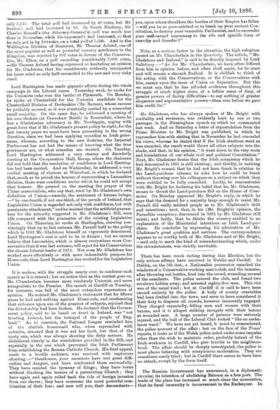Mr. Gladstone, who has always spoken of Mr. Bright with
cordiality and reverence, was evidently hurt by one or two passages in the Birmingham speech on which we commented last week. And on Saturday a letter of expostulation from the Prime Minister to Mr. Bright was published, in which he reproaches him with stating that in November he had concealed his views, whereas he stated that if the Irish elections went as was expected, the result would throw all other subjects into the shade, and that, in his opinion, "it went down to the very roots and foundations of our whole civil and political Constitution." Next, Mr. Gladstone denies that the Irish conspiracy which he had denounced in 1881 is still existing ; and thirdly, in noticing Mr. Bright's remark that he had not been frank in relation to the Land-purchase scheme, he asks how be could be frank without throwing over his colleagues on a subject on which they were entitled to be fully consulted. Lastly, he remonstrates with Mr. Bright for declaring his belief that he, Mr. Gladstone, means to thrust the Land-purchase Bill on the House of Com- mons. On Monday appeared Mr. Bright's reply, in which he says that the demand for a majority large enough to resist Mr. Parnell did really mislead people as to Mr. Gladstone's drift and intentions ; next, that, in his (Mr. Bright's) opinion, the Parnellite conspiracy denounced in 1881 by Mr. Gladstone still exists ; and lastly, that he thinks the country entitled to an explanation of the Ministerial intentions on Irish Land-pur- chase. He concludes by expressing his admiration of Mr. Gladstone's great qualities and services. The correspondence appears to us worthy both of Mr. Gladstone and of Mr. Bright, —and only to mark the kind of misunderstanding which, under the circumstances, was strictly inevitable.
















































 Previous page
Previous page